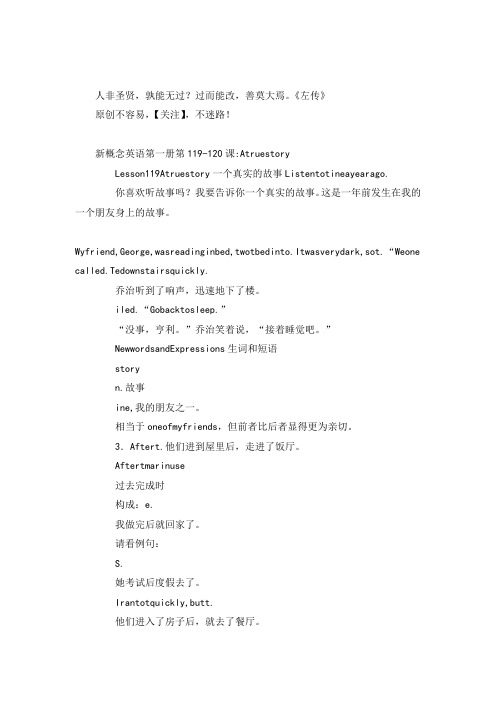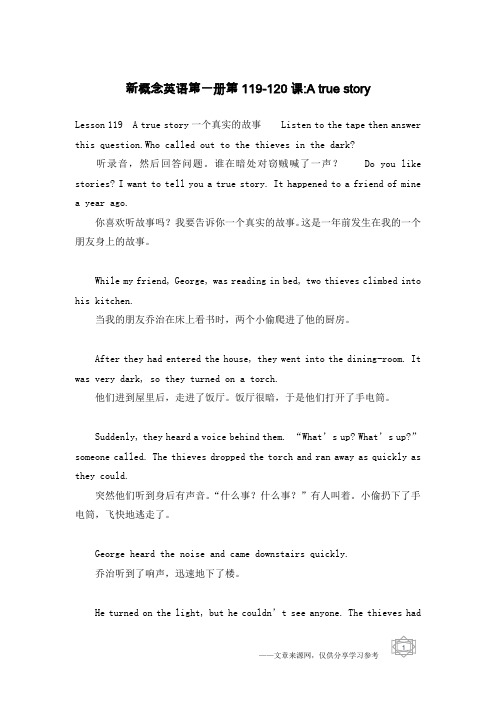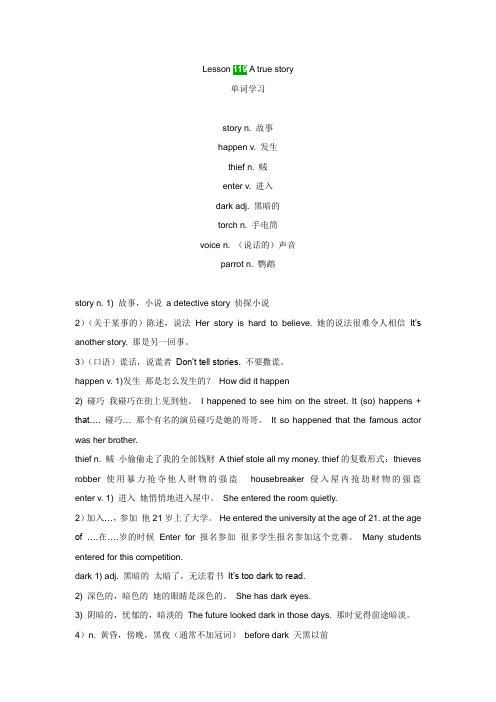新概念英语第一册119-120课课件
新概念英语第一册_第119-120课最终版PPTKEJ

.
9
Key words&expressions
❖ Voice n.
❖ ①声音 in an angry voice
❖ ②意见 speak out my voice
❖ lose one’s voice raise one’s voice
.
16
Language points Nhomakorabea❖ 3、It happened to a friend of mine a year ago.
happen to sb./sth. 发生在某人身上/某物上(通常 是不好的事)
What happened to your car? ❖ 双重所有格:a friend of mine = my friend;
Were you watching TV at ten last night? 6. Amy was writing a letter when the telephone rang.(对划线部分提问)
What was Amy doing when the telephone rang?
.
2
Key words&expressions
.
13
Listen and answer.
1. What was George doing when the thieves climbed into his kitchen?
He was reading in bed.
1. Did the thieves turn on the torch? Why?
.
7
新概念英语一lesson119-120(共20页)

• George heard the noise and came downstairs quickly. • heard the noise 听到声响 • came downstairs 下楼来 • He turned on the light, but he couldn’t see anyone. The thieves had already gone. • turn on the light 开灯 • someone用在肯定句中 • anyone用在否定句中
过去完成时
• • • • • • 过去完成时构成形式: had+ 过去分词 否定式:在had的后面加not 疑问句式:把had提前 我在干家务之前已经完成了作业。 I had finished my homework before I did the house work. • I had not finished my homework before I did the house work. • Had you finished your homework before you did the house work?
• • • • • • • • •
torch n. 1) 手电筒 开手电筒 turn on a torch 关手电筒 turn off a torch 2)火炬 Kindle a torch 燃起火炬 torch relay 火炬传递
• • • • • • • • • • •
voice n. 1) 声音 in an angry voice 以生气的声音 以伤心的声音 in a sad voice 他以伤心的声音告诉了我这个消息。 He told me this news in a sad voice. lose one’s voice 嗓子变哑 我因重感冒,嗓子都哑了。 I’ve lost my voice because of a bad cold.
2022年新概念英语第一册第119-120课-A true story

人非圣贤,孰能无过?过而能改,善莫大焉。
《左传》原创不容易,【关注】,不迷路!新概念英语第一册第119-120课:AtruestoryLesson119Atruestory一个真实的故事Listentotineayearago.你喜欢听故事吗?我要告诉你一个真实的故事。
这是一年前发生在我的一个朋友身上的故事。
Wyfriend,George,wasreadinginbed,twotbedinto.Itwasverydark,sot.“Weone called.Tedownstairsquickly.乔治听到了响声,迅速地下了楼。
iled.“Gobacktosleep.”“没事,亨利。
”乔治笑着说,“接着睡觉吧。
”NewwordsandExpressions生词和短语storyn.故事ine,我的朋友之一。
相当于oneofmyfriends,但前者比后者显得更为亲切。
3.Aftert.他们进到屋里后,走进了饭厅。
Aftertmarinuse过去完成时构成:e.我做完后就回家了。
请看例句:S.她考试后度假去了。
Irantotquickly,butt.他们进入了房子后,就去了餐厅。
Touruniversityenteredtineayearago.一年之前,一件奇怪的事发生在我的一位朋友身上。
(2)碰巧,恰好(to):Ieetywaye.在回家的路上,我碰巧遇见了她。
Ihappentoknowthatprofessor.我正好认识那位教授。
【素材积累】每个人对未来都有所希望和计划,立志是成功的起点,有了壮志和不懈的努力,就能向成功迈进。
1、立志多在少年,但宋朝文学家苏洵27岁开始发愤,立志就读,昼夜不息,结果大器晚成,终于成为唐宋八大家之一。
2、我国明代画家王冕,少年放牛时,立志要把荷花佳景惟妙惟肖地画出来。
他不分昼夜地绘画,立志不移,后来成为当时著名的画家。
3、越王勾践被吴国军队打败,忍受奇耻大辱,给吴王夫差当奴仆。
新概念英语第一册课件lesson 119-120

我来讲故事
Key words and expressions
(单词百宝箱)
1. story
/ 5stR:ri/
2. happen
/ 5hApEn/
3. thief
/ Wi:f/
4. enter
/ 5entE/
5. dark 6. torch 7. voice
/ da:k/ / tR:tF/ / vRis/
ago.
② v. 碰巧,恰好(to) 句型: 人+ happen to do sth. 碰巧 e.g. I happened to meet her on my way home. e.g. I fergot to bring the pen. She happens to have one.
4. 主从复合句:
3. happen v. 发生
① v. 发生 句型: 事 + happen to sb. 发生在……身上 e.g. It happened to a friend of mine last year. e.g. A strange thing happened to a friend of mine a year
8. parrot
/ 5pArEt/
9. exercise book
n.故事
v.发生;碰巧 n.贼 v.进入 a.黑暗的 n.手电筒 ,火炬 n.(说话的)声音 n.鹦鹉 n.练习本
1. story
/ 5stR:ri/
n.故事
1. story-stories e.g. tell stories.
2. happen
8. parrot
/ 5pArEt/
n.鹦鹉Βιβλιοθήκη 8. parrot: 鹦鹉 carrot: 胡萝卜
2024年新概念英语NCE1_lesson119-120(共33页)课件

4. Paul went(go) out with Jane after he had made(make) a phone call.
5. They had learned(learn) over 2000 words by the end of last term.
6. I have a lot of work to do(do).
(D)3. She said she ___the principle already.
A .has seen
B. saw
C. will see D.had seen
(D)4.A friend of ___ is a doctor. A.me B.my C.I D.mine
(C)5. She had written a number of books ______ the end of last year. A.for B.in C.by D.on
4.当安下楼时,小偷已走开了。 When Ann came downstairs,the theif ___ already ____.
1.我要给你讲一个真实的故事。 I want to tell you a true story.
2.当他到达车站时,火车已离开了。 When he got to the station,the train had already gone.
questions
1.When did two thieves climb into the kitchen?
2.How is Henry?
happen
1.A car accident happened to her
this morning.
2.What happened to you? 3.What happened to Helen last night? 4.I am very sorry for all happened to
新概念英语第一册Lesson119-Lesson120(共43张PPT)

2. _g_o__in__to__=_e_n_t_e_r___意为走进.
3. ___tu_r_n__o_n___意为打开(水、电、气等). 反义词为__tu__rn__o_f_f__ 还有 _t_u_r_n__u_p_开大点 _t_u_r_n__d_o_w_n_关小点
Lesson 119 A true story
Words
1. story / stɔ: ri / n.故事
2. happen
v.发生
3. thief /θi: f / n.小偷
4.enter /
/ v.进入
5. dark /dɑ: k/ adj.黑暗的
6. torch / tɔ: tʃ/ n. 手电筒
had take
future go
now
She __h_a_d__fi_n_i_sh__ed__ the housework before she __w_e_n_t__ out. (finish, go)
had finished went
future now
We __h_a_d__h_ad_ dinner before they__a_r_r_iv_e_d_. (have, arrive)
7. voice /vɔis/ n. 指“人的声音”
8. parrot /
/ n. 鹦鹉
Words
1. story / 'stɔ: ri / 故事
a true story 真实的故事
tell sb a story 讲故事
2. happen
v.发生
sth. happen to sb. 某事发生在某人身上
新概念英语NCE1_lesson119-120(共73页)课件

2. 过去完成时词可以表示过去
用法:
某一时刻之前发生的动作或呈 现的状态,这一动作一直持续
或将继续下去。
1. 到了六点钟为止,他们已经工作了八小时了。
By six o’clock they __h_a_d_w__o_r_k_e_d_ (work)for eight hours.
2. 我到广州时,他在那里很长时间了。
since you came since you got home. 注意:for 和since 所引导的时间状语都表示一段时间.
He has been away since last week. He has been away for one week.
对划线部分提问都用 How long
New
用法:
1. 过去完成时动词表示过去某一时间或某 一动作之前完成的动作或状态。强调过去 某一动作发生在另一动作之前时。
1.他说他以前见过你。 He said that he ____h_a_d__se_e_n____ (see) you before.
2. 当我们到那儿时火车已经离开了。 The train __h_a_d__le_f_t__ (leave) when we arrived there.
had eaten an apple
slept
now
She had eaten an apple before she slept.
After she had eaten an apple , she slept.
1. did his homework 2. played ping pong
——————∣—————∣—————→∣——→
• A. take
新概念英语NCE1_lesson119-120(共24页)课件

Questions
❖ 1 T: How long ago did this story happen ? ❖ 2 T: What was George doing when two thieves climbed into his
kitchen? ❖ 3 T: Where did they go after they had entered the house ? ❖ 4 T: What did they hear suddenly? ❖ 5 T: What could George see when he came downstairs ? ❖ 6 T: Who had called out in the dark?
半条树叶自己黄,
架后放着一捆粮,
妻子拿刀砍牛狼,
就像窃贼逃命忙
国籍名变复数
中国日本和瑞士,复数不需加-s, (Chinese, Japanese, Swiss)
Байду номын сангаас
英国法国荷兰人,要把man变men, (Englishmen, Frenchmen, Dutchmen)
-an,-ian各国人,后边直接加-s
Review the grammar we have
learned
名词变复数
名词变复数
单数变为复数式, 加上“s”统言之。
下列结尾名词后, 要加“s”先加“e”:
发音 [s]和[z],或是辅音加“o”时。
❖
有些名词变复数, 词尾变化要注意:
“y”前字母是辅音,一律变“y”为“ie”;
遇到“f/fe”, 有时需要变“ve”。
少数名词不规则, 特别情况靠硬记。
以辅音加o结尾的单词
"两人两菜"(黑人,英雄,西红柿,土豆)
新概念英语NCE1_lesson119-120(共20页)课件

• thief n. 贼 • 小偷偷走了我的全部钱财 • A thief stole all my money. • thief的复数形式:thieves
• robber
使用暴力抢夺他人财物的强盗
• happen v. • 1)发生 • 那是怎么发生的?
• How did it happen? • 2) 碰巧 • 我碰巧在街上见到他。
• I happened to see him on the street. • It (so) happens + that…. 碰巧… • 那个有名的演员碰巧是她的哥哥。
•
• dark • 1) adj. 黑暗的 • 太暗了,无法看书
• It’s too dark to read. • 2) 深色的,暗色的 • 她的眼睛是深色的。
• She has dark eyes. • 3) 阴暗的,忧郁的,暗淡的 • The future looked dark in those days. • 那时觉得前途暗淡。 • 4)n. 黄昏,傍晚,黑夜(通常不加冠词) • before dark 天黑以前
• housebreaker 侵入屋内抢劫财物的强盗
• enter v. • 1) 进入 • 她悄悄地进入屋中。 • She entered the room quietly. • 2)加入…,参加 • 他21岁上了大学。 • He entered the university at the age of 21. • at the age of ….在….岁的时候 • Enter for 报名参加 • 很多学生报名参加这个竞赛。 • Many students entered for this competition.
(完整版)新概念英语第一册第119课课件

C. has learned, the piano D. learns ,piano
❖ 3.The students ____B_____ their classroom when the visitors arrived.
A . have cleaned B. had cleaned
C. was cleaned D. have been cleaned
Video Questions on the text
❖ 1.When did the story happen?
❖ 2.What was George doing when the thieves entered the room?
❖ 3.Why did they turn on a torch?
Lesson 119
A true story
Key words&expressions
❖ dining room ❖ coin ❖ mouth ❖ swallow ❖ later ❖ toilet ❖ ring
n. n. v. adv. n. v.
饭厅 硬币 嘴 吞下 后来 厕所 响
Free talk
Language points
❖ 4、While my friend, George, was reading in bed, two thieves climbed into his kitchen.
when
climb into 爬进。 ❖ 5、After they had entered the house, they went
Key words&expressions
❖ 5. dark ❖ adj. ①黑暗的 ❖ too dark ❖ ②深色的 ❖ dark blue
新概念英语第一册第119-120课-A true story

新概念英语第一册第119-120课:A true storyLesson 119 A true story一个真实的故事Listen to the tape then answer this question.Who called out to the thieves in the dark?听录音,然后回答问题。
谁在暗处对窃贼喊了一声?Do you like stories? I want to tell you a true story. It happened to a friend of mine a year ago.你喜欢听故事吗?我要告诉你一个真实的故事。
这是一年前发生在我的一个朋友身上的故事。
While my friend, George, was reading in bed, two thieves climbed into his kitchen.当我的朋友乔治在床上看书时,两个小偷爬进了他的厨房。
After they had entered the house, they went into the dining-room. It was very dark, so they turned on a torch.他们进到屋里后,走进了饭厅。
饭厅很暗,于是他们打开了手电筒。
Suddenly, they heard a voice behind them. “What’s up? What’s up?”someone called. The thieves dropped the torch and ran away as quickly as they could.突然他们听到身后有声音。
“什么事?什么事?”有人叫着。
小偷扔下了手电筒,飞快地逃走了。
George heard the noise and came downstairs quickly.乔治听到了响声,迅速地下了楼。
新概念英语第一册 Lesson119-120 (共29张PPT)

happen
torch
thief parrot
voice dark
Text: A true story
Q: Who called out to the thieves in the dark?
一 个目标 坚持不 懈地努 力的精 神值得 我们学 习。
记 得 有 一 年 暑假,爸 爸教我 骑自行 车。一 开始的 时候,我 满怀好 奇与激动的心情跟着 爸 爸 在 幽 静 的小道 上学习 自行车 ,看着爸 爸英姿 飒爽威 武的骑 车舞姿 ,我的仰慕之情 油 然 而 生 ,心 里痒痒 的,恨不 得马上 骑上我 心仪已 久的“ 宝马神 车”,与 爸爸 并驾齐 驱 ,决 一 高 下 。不过 梦想最 终回归 于现实 ,我不得 不从‘ 0’开始 学起,一路上跌跌撞撞 ,磕 磕 碰 碰 ,满 满的自 信心像 泄了气 的皮球 似的。 这时爸 爸对我 说:“为 目标奋斗到底 ,才 能 成 为 最 后的赢 家。” 于是我 重拾信 心,坚持 不懈地 训练,最 后我 终于学 会了骑
Sentences
4. It was very dark, so they turned on a torch. 结构:本句的连词so,表结果,意思是所以。 与turn相关的动词短语
turn on 打开; turn off 关掉; turn up 调高音量; turn down 调低音量 e.g. Listen! It’s time for news. Please turn up the radio.
他出了什么事?
(3). thief n. 小偷 复数为thieves
新概念119-120课(第一课时)

when
不管是在口语中,还是在书面语中,when是一个十分活跃的词,该词主要用作 连词和副词,但是在意义方面其用法比较复杂。 一、作副词 1. 作疑问副词,用于构成特殊疑问句,意为“什么时候;何时”
When will they come back?他们什么时间回来? 2. 作连接副词,引导名词性从句,或与不定式连用,意为“什么时候”
lesson 116
every 每一个
every 每一个 everyone 每一个人 everybody 每一个人(多用于口语中) everything 每件事情 everywhere 到处,每个地方
none 没有
no one 没有人 nobody 没有人 nothing 没什么事情 nowhere 不在任何地方
★ joke
/d uk/
v. 开玩笑
4
Key knowledge
不定代词
形容词修饰不定代词,放在不定代词之后
6/16/2021
课文详解
1. Isn‘t there anyone at home? 家里没人吗?
否定疑问句 复合不定代词 anyone 看作单数, 用在疑问句和否定句中。
6/16/2021
It's nice and warm sitting by the fire. Everybody arrived nice and early.
6/16/2021
e and have something to drink.
11. May I have a glass of beer please? May I…?≈ Could I…? 语气比can I…?委婉
复合不定代词 no one看作单数,本身表否定。 No one wants that room.
新概念英语第一册119-120

Lesson 119 A true story单词学习story n. 故事happen v. 发生thief n. 贼enter v. 进入dark adj. 黑暗的torch n. 手电筒voice n. (说话的)声音parrot n. 鹦鹉story n. 1) 故事,小说a detective story 侦探小说2)(关于某事的)陈述,说法Her story is hard to believe. 她的说法很难令人相信It’s another story. 那是另一回事。
3)(口语)谎话,说谎者Don’t tell stories. 不要撒谎。
happen v. 1)发生那是怎么发生的?How did it happen2) 碰巧我碰巧在街上见到他。
I happened to see him on the street. It (so) happens + that…. 碰巧… 那个有名的演员碰巧是她的哥哥。
It so happened that the famous actor was her brother.thief n. 贼小偷偷走了我的全部钱财A thief stole all my money. thief的复数形式:thieves robber 使用暴力抢夺他人财物的强盗housebreaker 侵入屋内抢劫财物的强盗enter v. 1) 进入她悄悄地进入屋中。
She entered the room quietly.2)加入…,参加他21岁上了大学。
He entered the university at the age of 21. at the age of ….在….岁的时候Enter for 报名参加很多学生报名参加这个竞赛。
Many students entered for this competition.dark 1) adj. 黑暗的太暗了,无法看书It’s too dark to read.2) 深色的,暗色的她的眼睛是深色的。
- 1、下载文档前请自行甄别文档内容的完整性,平台不提供额外的编辑、内容补充、找答案等附加服务。
- 2、"仅部分预览"的文档,不可在线预览部分如存在完整性等问题,可反馈申请退款(可完整预览的文档不适用该条件!)。
- 3、如文档侵犯您的权益,请联系客服反馈,我们会尽快为您处理(人工客服工作时间:9:00-18:30)。
What happened? 它是什么时候发生的?
When did it happen? sth happen to sb 某事发生在某人的身上 总有好事发生在我的身上。
Good things always happen to me.
• sb happen to do sth 某人碰巧做某事 我昨天把前门的钥匙弄丢了,妈妈碰巧在花园 里发现了它。
I lost my key to the front door yesterday. My mother happened to find it in the garden. • A friend of mine 双重所有格=my friend • a year ago 一年前 ….ago …以前(用于过去时态) • 一年前我在法国找不到工作。
tell sb a story 给某人讲故事 • 你能给我们讲个故事吗?
Can you tell us a story? • true adj. 真实的
a true story 真实故事 truth n. 事 实,真相
Tell me the truth. 告诉我事情的真相。
• It happened to a friend of mine a year ago. • happen v. 发生
• He turned on the light, but he couldn’t see anyone. The thieves had already gone.
• turn on打开 turn off 关掉 turn up 开大 声 turn down 调小声
• someone用在肯定句中 • anyone用在否定句中
Lesson 119
A true story
单词学习
• story ['stɔːrɪ] n. 故事
• happen ['hæp(ə)n] v. 发生
• thief [θiːf]
n. 贼
• enter ['entə] v. 进入
• dark [dɑːk]
adj. 黑暗的
• torch [tɔːtʃ] n. 手电筒
Listening
• Listen to the tape then answer this question. Who called out to the thieves in the dark?
课文讲解
• Do you like stories? • stories是story的复数形式,前面没有定冠词
• 2. She said she __________ the principle already A .has seen B. saw C. will see D. had seen
• 3. She said her family _______ themselves ______ the army during the wa r. A. has hidden, from B. had hidden, from C. has hidden, with D. had hidden, with
I couldn’t find a job in Pairs a year ago.
• While my friend, George, was reading in bed, two thieves climbed into his kitchen.
• in bed 躺在床上 • stay in bed 躺在床上 • climb into… 爬到… 里 面去 • while 表示“当…的时候”,相当when,强调主
the,表示泛指,而不是数量概念。 • 她喜欢猫 • She likes cats. • 我们喜欢读书 • We like reading books • I hate the dog. • 我讨厌这只狗
• I want to tell you a true story. • tell a story 讲故事
• 我到达的时候,电影己经放映了。
• The film had already begun when I got there. • 我回来之前,他们己经离去。
• They had left before I came back.
• 表示由过去某一时间开始,一直延续到过去另一 时间的动作或状态。
• 我在车站等了20分钟,一辆公共汽车终于来了。
• in a sad voice • 他以伤心的声音告诉了我这个消息。
• He told me this news in a sad voice. • lose one’s voice 嗓子变哑 • 我因重感冒,嗓子都哑了。
• I’ve lost my voice because of a bad cold.
• It so happened that the famous actor was her brother.
• thief n. 贼
• 小偷偷走了我的全部钱财
• A thief stole all my money.
• thief的复数形式:thieves
以f结尾的名词变复数时,去f加ves的还有
wolf, leaf等
• robber
使用暴力抢夺他人财物的强盗
• housebreaker 侵入屋内抢劫财物的强盗
• enter v. (entrance n. 入口 exist n. 出口 ) • 1) 进入 • 她悄悄地进入屋中。 • She entered the room quietly. • 2)加入…,参加 • 他21岁上了大学。 • He entered the university at the age of 21. • at the age of ….在….岁的时候 • Enter for 报名参加 • 很多学生报名参加这个竞赛。 • Many students entered for this competition.
• voice [vɒɪs]
n. (说话的)声音
• parrot ['pærət] n. 鹦鹉
• story n. • 1) 故事,小说 • a detective story 侦探小说 • 2)(关于某事的)陈述,说法 • Her story is hard to believe. • 她的说法很难令人相信 • It’s another story. • 那是另一回事。 • 3)(口语)谎话,说谎者 • Don’t tell stories. • 不要撒谎。
• I now look forward to going back to work as soon as possible.
过去完成时
• 过去完成时构成形式: • had+ 过去分词 • 否定式:在had的后面加not • 疑问句式:把had提前 • 我在干家务之前已经完成了作业。
• I had finished my homework before I did the house work.
句与从句的动作同时发生。
• 我的爸爸正在做饭的时候,门铃响了。
• While my father was cooking, the doorbell rang. • 我正在打信的时候,我的朋友打电话来了。
• While I was typing a letter, my friend called.
• I had not finished my homework before I did the house work.
• Had you finished your homework before you did the house work?
• 表示在过去某一时刻或动作以前己经完成 的动作, 即“过去的过去”。这个过去的时刻可以用by, before等介词短语,时间状语或者从句来表示。
• happen v. • 1)发生 • 那是怎么发生的?
• How did it happen? • 2) 碰巧 • 我碰巧在街上见到他。
• I happened to see him on the street. • It (so) happens + that…. 碰巧… • 那个有名的演员碰巧是她的哥哥。
• But George’s parrot, Henry, was still there. • Henry 是George’s parrot的同位语。 • still 仍然 • “What’s up, George?” he called. ‘Nothing,
Henry,’ George said and smiled.’ Go back to sleep.’ • he called 指the parrot called 动物有时用he 或 she来代替,是“拟人“的写法 • nothing 指什么事也没有 • go back to… 回到(地方,某种状态) • 我现在期望尽快回到工作上来。
• After they had entered the house, they went into the dinning room. It was very dark, so they turned on a torch. turn on a torch 打开手电筒。
• Suddenly, they heard a voice behind them. ’What’s up? What’s up?’ someone called. voice是指嗓音,说话的声音,由声带振动发出的 声音。
• He wrote the letter as clearly as he could • 她尽可能地把车开快
• She drove as fast as the could.
• George heard the noise and came downstairs quickly.
